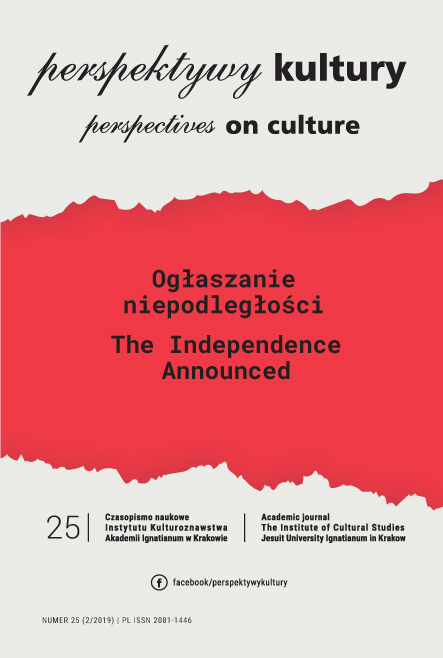From the January Uprising of 1863 to Regaining Independence in 1918 – a Synthesis of Polish History in the Blue uniform [Błękitny mundur] by Donata Dominik-Stawicka
Abstract
The novel of Donata Dominik-Stawicka entitled The Blue uniform [Błękitny mundur] treats about Poles’ way to regaining independence by Poland, starting from the January Uprising in 1863 to November 1918. The way to freedom consisted of the armed struggle of Poles from various partitions, the tragic that in time World War I, fighting on different fronts under foreign command, they had to stand against each other. The title blue uniform is a reference to the biography of one of the heroes of the novel – the soldier of the Blue Army of General Józef Haller. He is, next to the gray uniform of soldiers of Józef Piłsudski, a symbol of dreams about the Polish army and the free homeland. The Blue Uniform is a family saga based on the stories of ancestors, photographs and other souvenirs. Family history on the basis of pars pro toto becomes a story about a nation struggling for survival, its own identity and dignity. The memory of the past of an individual and collective character passed from one generation to the next turns out to be the superior value. Intergenerational communication builds historical, cultural and community identity. The intergenerational relationship is ethical and the memory of the past is the same as pride. The author writes her narrative about the family and the nation into the post-memory discourse. Thanks to the testimonies of our ancestors, history becomes an important source of identity.
References
Cassirer E., Esej o człowieku. Wstęp do filozofii kultury, transl. A. Staniewska, introduction B. Suchodolski, Warszawa 1998.
Dominik-Stawicka D., Błękitny mundur, czyli drogi do wolności, Kraków 2018.
Halbwachs M., Społeczne ramy pamięci, transl. M. Król, Warszawa 1969.
Hirsz M. Żałoba i postpamięć, transl. K. Bojarska, in: Teoria wiedzy o przeszłości na tle współczesnej humanistyki, ed. E. Domańska, Poznań 2010.
Janion M., Płacz generała. Eseje o wojnie, Warszawa 2007.
Kula M., Nośniki pamięci historycznej, Warszawa 2002.
Na krawędzi epoki. Rozwój duchowy i działanie człowieka, eds. J. Rudniański, K. Murawski, Warszawa 1985.
Nęcka E., Orzechowski J., Szymura B., Psychologia poznawcza, Warszawa 2006
Olsen B., W obronie rzeczy. Archeologia i ontologia przedmiotów, transl. B. Shallcross, Instytut Badań Literackich PAN, Warszawa 2013.
Prokop J., Szczególna przygoda żyć nad Wisłą, Londyn 1985.
Prokop J., Uniwersum polskie. Literatura, wyobraźnia zbiorowa, mity polityczne, Kraków 1993.
Reduta. Romantyczna poezja niepodległościowa, ed. M. Janion, Kraków 1979.
Ricoeur P., Pamięć-zapomnienie-historia, in: Tożsamość w czasach zmiany. Rozmowy w Castel Gandolfo, edited and introduction by K. Michalski, Warszawa–Kraków 1995.
Rzeczy i ludzie. Humanistyka wobec materialności, eds. J. Kowalewski et al., Olsztyn 2008.
Sprusiński M., Juliusz Kaden-Bandrowski. Życie i twórczość, Kraków 1971.
Szacka B., Pamięć zbiorowa i wojna, “Przegląd Socjologiczny” 2000, R. 49.
Trybuś K., Pamięć romantyzmu. Studia nie tylko z przeszłości, Poznań 2011.
Wyka K., Pokolenia literackie, Kraków 1977.
Copyright (c) 2019 Jesuit University Ignatianum in Krakow

This work is licensed under a Creative Commons Attribution-NoDerivatives 4.0 International License.
Autor, zgłaszając swój artykuł, wyraża zgodę na korzystanie przez Wydawnictwo Uniwersystet Ignatianum z utworu na następujących polach eksploatacji:
- utrwalania utworu w formie papierowej, a także na nośniku cyfrowym lub magnetycznym;
- zwielokrotnienia utworu dowolną techniką, bez ograniczenia ilości wydań i liczby egzemplarzy;
- rozpowszechniania utworu i jego zwielokrotnionych egzemplarzy na jakimkolwiek nośniku, w tym wprowadzenia do obrotu, sprzedaży, użyczenia, najmu;
- wprowadzenia utworu do pamięci komputera;
- rozpowszechniania utworu w sieciach informatycznych, w tym w sieci Internet;
- publicznego wykonania, wystawienia, wyświetlenia, odtworzenia oraz nadawania i reemitowania, a także publicznego udostępniania utworu w taki sposób, aby każdy mógł mieć do niego dostęp w miejscu i czasie przez siebie wybranym.
Wydawca zobowiązuje się szanować osobiste prawa autorskie do utworu.





